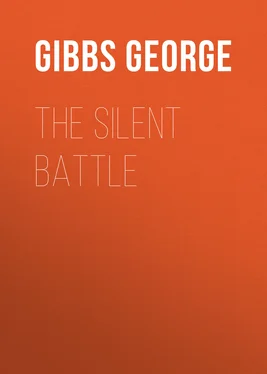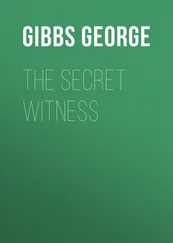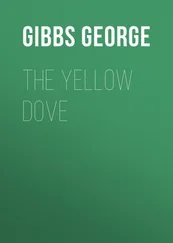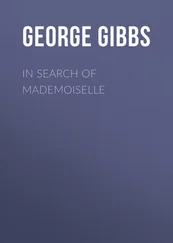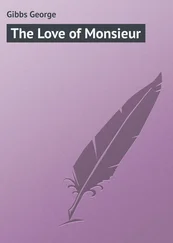George Gibbs - The Silent Battle
Здесь есть возможность читать онлайн «George Gibbs - The Silent Battle» — ознакомительный отрывок электронной книги совершенно бесплатно, а после прочтения отрывка купить полную версию. В некоторых случаях можно слушать аудио, скачать через торрент в формате fb2 и присутствует краткое содержание. Жанр: foreign_prose, foreign_antique, на английском языке. Описание произведения, (предисловие) а так же отзывы посетителей доступны на портале библиотеки ЛибКат.
- Название:The Silent Battle
- Автор:
- Жанр:
- Год:неизвестен
- ISBN:нет данных
- Рейтинг книги:5 / 5. Голосов: 1
-
Избранное:Добавить в избранное
- Отзывы:
-
Ваша оценка:
- 100
- 1
- 2
- 3
- 4
- 5
The Silent Battle: краткое содержание, описание и аннотация
Предлагаем к чтению аннотацию, описание, краткое содержание или предисловие (зависит от того, что написал сам автор книги «The Silent Battle»). Если вы не нашли необходимую информацию о книге — напишите в комментариях, мы постараемся отыскать её.
The Silent Battle — читать онлайн ознакомительный отрывок
Ниже представлен текст книги, разбитый по страницам. Система сохранения места последней прочитанной страницы, позволяет с удобством читать онлайн бесплатно книгу «The Silent Battle», без необходимости каждый раз заново искать на чём Вы остановились. Поставьте закладку, и сможете в любой момент перейти на страницу, на которой закончили чтение.
Интервал:
Закладка:
He had sunk on the log beside her for the comfort of the blaze, and as she spoke the shadows under his brows darkened with his frown and the chin beneath its stubble hardened in deep lines.
“I sometimes think that Thoreau had the right idea of life,” she said slowly. “There are infinite degrees of gluttony—infinite degrees of drunkenness. I felt shame for you just now—for myself—for the blood on your hands. I can’t explain it. It seemed different from everything else that you have done here in the woods, for the forest is clean, sweet-smelling. I did not like to feel ashamed for you. You see,” she smiled, “I’ve been rating you very highly.”
“No,” he groaned, his head in his hands. “Don’t! You mustn’t do that!”
At the somber note she turned and looked at him keenly. She could not see his face, but the fingers that hid it were trembling.
“You’re ill!” she gasped. “Your body is shaking.”
He sat up with an effort and his face was the color of ashes.
“No, it’s nothing. Just a chill, I think. I’ll be all right in a minute.”
But she put her arm around him and made him sit on the log nearest to the fire.
“This won’t do at all,” she said anxiously. “You’ve got to take care of yourself—to let me take care of you. Here! You must drink this.”
She had taken the flask from her pocket and before he knew it had thrust it to his lips. He hesitated a moment, his eyes staring into space and then without question, drank deep, his eyes closed.
And as the leaping fires went sparkling through his body, he set the vessel down, screwed on the lid and put it on the log beside him. Two dark spots appeared beneath the tan and mounted slowly to his temples, two red spots like the flush of shame. An involuntary shudder or two and the trembling ceased. Then he sat up and looked at her.
“A mustard foot-bath and some quinine, please,” he asked with a queer laugh.
But she refused to smile. “You slept in your soaking clothes last night,” severely.
He shrugged his shoulders and laughed again.
“That’s nothing. I’ve done that often. Besides, what else could I do? If you had wakened me–”
“That is unkind.”
She was on the verge of tears. So he got to his feet quickly and shaking himself like a shaggy dog, faced her almost jauntily.
“I’m right as a trivet,” he announced. “And I’m going to call you Hebe—the cup-bearer to the gods—or Euphrosyne. Which do you like the best?”
“I don’t like either,” she said with a pucker at her brow. And then with the demureness which so became her. “My name is—is Jane.”
“Jane!” he exclaimed. “Jane! of course. Do you know I’ve been wondering, ever since we’ve been here what name suited you best, Phyllis, Millicent, Elizabeth, and a dozen others I’ve tried them all; but I’m sure now that Jane suits you best of all. Jane!” he chuckled gleefully. “Yes, it does—why, it’s you . How could I ever have thought of anything else?”
Her lips pouted reluctantly and finally broke into laughter, which showed her even white teeth and discovered new dimples.
“Do you really like it?”
“How could I help it? It’s you , I tell you—so sound, sane, determined and a little prim, too.”
“I’m not prim.”
“Yes,” he decided, “you’re prim—when you think that you ought to be.”
“Oh.”
He seated himself beside her, looking at her quizzically as though she was a person he had never seen before—as though the half-identity she provided had invested her with new and unexpected attributes.
“It was nice of you to tell me. My name is Phil,” he said.
“Is it?” she asked almost mechanically.
“Yes, don’t you like it?”
Her glance moved quickly from one object to another—the shelter, the balsam bed, and the crutch which leaned against the door flap.
“Don’t you like it?” he repeated eagerly.
“No,” quietly. “It isn’t like you at all.”
Probed for a reason, she would give none, except the woman’s reason which was no reason at all. Only when he ceased probing did she give it, and then voluntarily.
“I’m afraid I’ll have to change it then,” he laughed.
“Yes, change it, please. The only Phils I’ve ever known were men of a different stripe—men without purposes, without ambitions.” And then, after a pause, “I believe you to be different.”
“No! I have no purposes—no ambitions,” he said glowering again at the fire.
“That is not true.”
“How do you know?”
“Because you have ideals—of purity, of virtue, of courage.”
“No,” he mumbled, “I have no ideals. Life is a joke—without a point. If it has any, I haven’t discovered it yet.”
Her eyes sought his face in a vague disquiet, but he would not meet her look. The flush on his cheek had deepened, his gaze roved dully from one object to another and his fingers moved aimlessly upon his knees. She had proved him for three days, she thought, with the test of acid and the fire, but she did not know him at this moment. The thing that she had discovered and recognized as the clean white light of his inner genius had been suddenly smothered. She could not understand. His words were less disturbing than his manner, and his voice sounded gruff and unfamiliar to her ears.
She rose quietly and moved away, and he did not follow her. He did not even turn his head and for all she knew was not aware that she had gone. This was unlike him, for there had never been a moment since they had met when she could have questioned his chivalry, his courtesy or good manners. Her mind was troubled vaguely, like the surface of a lake which trembles at the distant storm.
A walk through the forest soothed her. The brook—her brook and his—sang as musically as before, the long drawn aisles had not changed, and the note of praise still swelled among the fretted vaults above. The birds made light of their troubles, too, and the leaves were whispering joyously the last gossip of the wood. What they said she could not guess, but she knew by the warm flush that had risen to her cheeks that it must be personal.
When she returned to camp her arms were full of asters and cardinal flowers. He greeted her gravely, with an almost too elaborate politeness.
“I hope you’ll forgive me,” he begged her. “I don’t think I’m quite myself to-day.”
“Are you feeling better?” she questioned.
“Yes, I’m quite—quite comfortable. I was afraid I had offended you.”
“Oh, no, I didn’t understand you for a moment. That was all.” She lifted the flowers so that he might see them better. “I’ve brought these for our lunch-table.”
But he did not look at them. His eyes, still glowing unfamiliarly, sought only hers.
“Will you forgive me?”
“Yes, of course,” lightly.
“I want—I want your friendship. I can’t tell you how much. I didn’t say anything that offended you, did I? I felt pretty seedy. Everything seemed to be slipping away from me.”
“Not now?”
“Oh, no. I’m all right.”
He took the flowers from her arms and laid them at the foot of a tree. Then coming forward he thrust out both his hands suddenly and took her by the elbows.
“Jane!” he cried, “Jane! Look up into my eyes! I want you to see what you’ve written there. Why haven’t you ever seen it? Why wouldn’t you look and read? It’s madness, perhaps; but if it’s madness, then madness is sweet—and all the world is mad with me. There isn’t any world. There’s nothing but you and me—and Arcadia.”
She had turned her gaze to the ground and would not look at him but she struggled faintly in his embrace. The color was gone from her cheeks now and beneath the long lashes that swept her cheek—one great tear trembled and fell.
Читать дальшеИнтервал:
Закладка:
Похожие книги на «The Silent Battle»
Представляем Вашему вниманию похожие книги на «The Silent Battle» списком для выбора. Мы отобрали схожую по названию и смыслу литературу в надежде предоставить читателям больше вариантов отыскать новые, интересные, ещё непрочитанные произведения.
Обсуждение, отзывы о книге «The Silent Battle» и просто собственные мнения читателей. Оставьте ваши комментарии, напишите, что Вы думаете о произведении, его смысле или главных героях. Укажите что конкретно понравилось, а что нет, и почему Вы так считаете.
